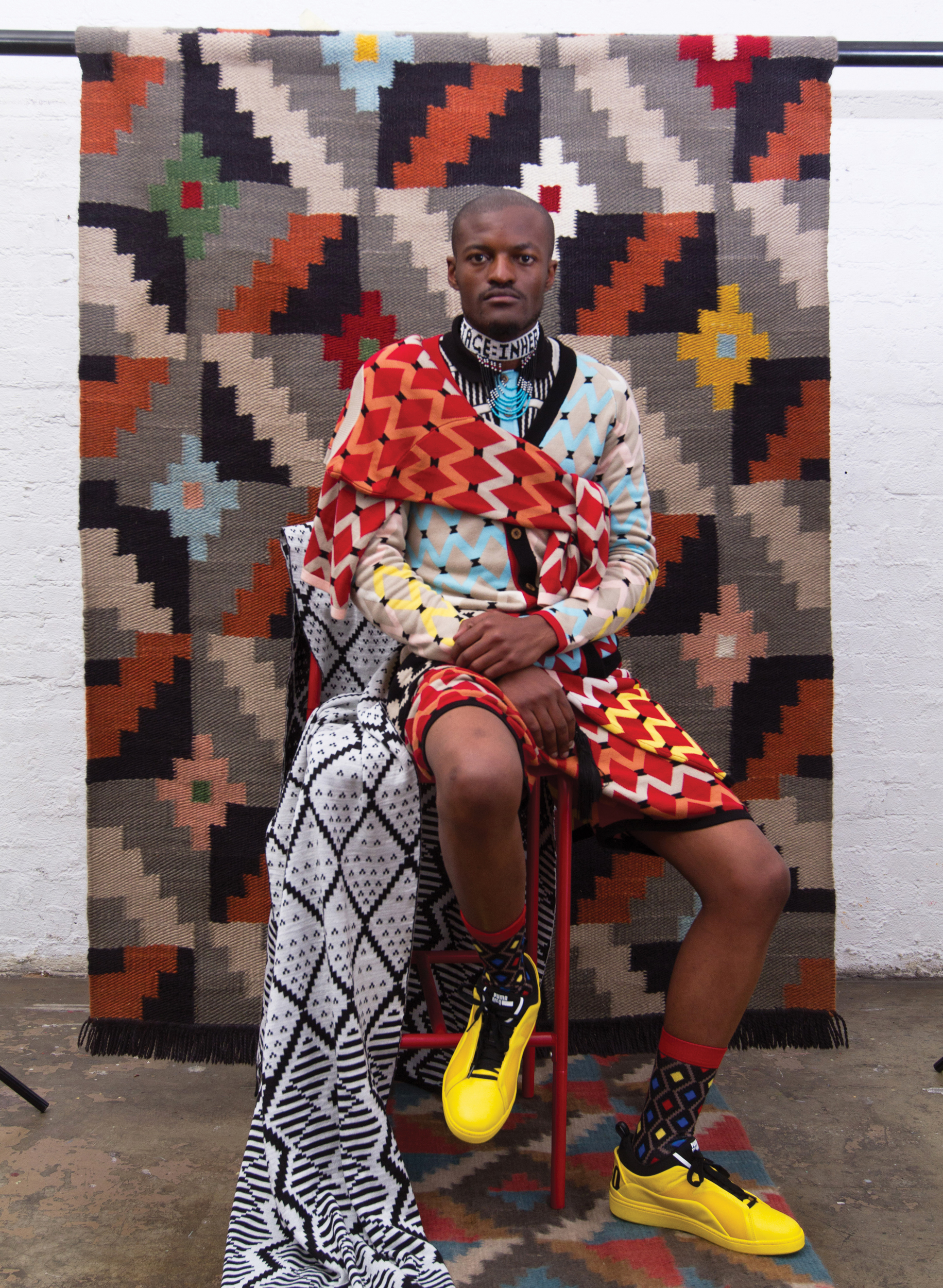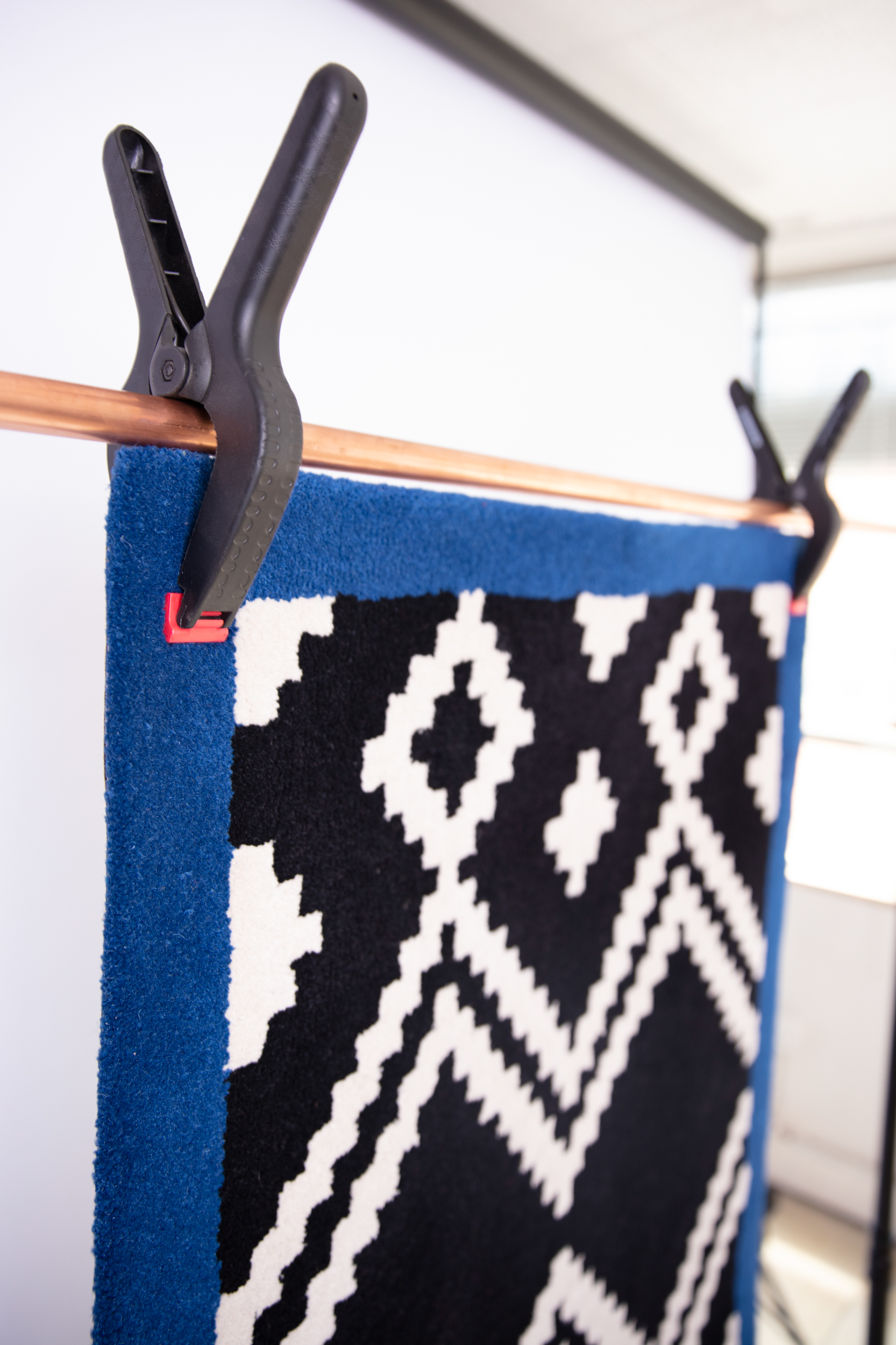Come International Workers Day, 1 May, 2020, the MAXHOSA Africa brand will open the doors of its second flagship store, at Cape Town’s V&A Waterfront shopping mall, one of Africa’s most visited destinations.
“We’ll be in a luxury aisle next to Mont Blanc, alongside Gucci and Louis Vuitton,” says MAXHOSA founder and designer Laduma Ngxokolo.
His brand started as a thesis when he was at Nelson Mandela University in Port Elizabeth, back in 2010, and was officially established in 2011, as “MAXHOSA by Laduma”. Since then the brand has won a string of awards and its patterned knitwear range has consistently attracted the attention of consumers in South Africa and beyond, as well as of local and international fashion media, and high-profile global celebrities. More recently, the range has expanded to include accessories like scarves, beanies, socks, as well as homeware items like patterned rugs.

MAXHOSA AFRICA founder Laduma Ngxokolo, dressed in MAXHOSA AFRICA. Image supplied by MAXHOSA AFRICA
The label, now rebranded as MAXHOSA Africa, has a flagship store at Mall of Africa in Johannesburg, while the ready-to-wear collection is also available at selected boutiques in SA, New York, France, Australia and online.
In Port Elizabeth, where Ngxokolo hails from, “we have a physical distributor, a person who actually visits homes and sells.
“But Port Elizabeth is ultimately where we want to have the biggest flagship; a museum with historical Xhosa pieces. A super destination where people can come and shear a goat and make their own yarn. I see that happening next year.”
Port Elizabeth might not be the top-of-mind destination for most entrepreneurial minds when thinking of a location for a flagship outlet for a lifestyle brand that envisions itself in the homes and closets of consumers with an affinity for luxury goods, in South Africa, the continent, and beyond.
To understand Ngxokolo’s Port Elizabeth plans, it is important to recognise the designer’s attachment to home and identity. From its founding, the brand’s ethos was rooted in culture. The patterns which made it famous were inspired by Xhosa beadwork designs and colours. The very first silhouettes were cardigans, the kind worn by young Xhosa men after they come out of the initiation ritual.
- MAXHOSA AFRICA campaign images, shot by Buka Andile
Ngxokolo has repeatedly stated that he had these initiates in mind when he was working on the thesis that birthed his brand. He wanted to develop a premium knitwear range that celebrated traditional Xhosa beadwork aesthetics, instead of the argyle and check patterns they usually wore. From that starting point, he has gone on to embrace and explore identity further.
“I make it explicit to everyone that I meet that South Africa is my priority market, because my pieces were designed for a psychological struggle, the psychological struggle of identity, the psychological struggle of economic depression, of losing jobs in the textile sector. It was built on psychological issues of confidence… because there was no proudly black luxury brand out there, one that’s serving its own. I wanted to confront those issues.
“And, I wanted to make sure that I actually cement myself in South Africa, so that when I’m ready to go and infiltrate the outside, I know that I’m blessed at home, that I’ve got home-town glory,” Ngxokolo explains.
One of many challenges that designers perceive and often share with us in interviews, is that they struggle to find a market in South Africa for their collections. Through trunk sales and off-schedule shows during international fashion weeks, and publicity in international media titles, many work hard to develop a customer base outside of South Africa, with varying levels of success.
“The hypothesis that there is no market here is completely untrue. It cannot be quantified in numbers,” says Ngxokolo.
“What I’ve learnt over the years is that South Africa is a very sentimental and emotional market. People do have money to spend, but they are not finding the right ethos, the right philosophy, the right product, to invest in. How about we give them a reason to buy our products? I think a lot of designers have such a strong ambition to make it overseas that the needs of the local market don’t matter to them.”

MAXHOSA Africa patterned cushions. Image supplied by MAXHOSA Africa
The designer has experienced his fair share of challenges while trying to build a brand and consumer base in the context of South Africa’s troubled manufacturing industry. One particular challenge that haunts many designers, especially those who wish to brand their product as luxury, is production.
“Luxury manufacturing almost doesn’t exist in South Africa. We only know the likes of Cape Cobra which makes luxury bags; there’s no luxury manufacturer we know for woven products, luxury shoes, belts and whatnot,” says Ngxokolo.
“As much as we want to create proudly African brands and products and jobs, there are no go-to manufacturers.”
Faced with the challenge and seeking to get a closer handle on quality control,when he found out one of the factories that was handling his production was up for sale, Ngxokolo made an offer. Two years later, the space in downtown Johannesburg, which he co-owns with business associates, is now home to the MAXHOSA brand’s very own factory and atelier.
“The easiest way would have been to produce in China, but that would compromise our credibility. What are the chances of people celebrating the brand like they do, if it has branding that’s written ‘Made in China’?
“Now, with the exception of accessories like socks and homeware items like rugs, which we source from Lesotho, Cape Town and Durban, all our production comes from our Johannesburg factory. Nothing is manufactured outside South[ern] Africa.”

MAXHOSA Africa patterned rugs. Image supplied by MAXHOSA Africa
In addition to issues with the manufacturing and textile industry, Ngxokolo also highlights the struggle SA designers have with getting retail space in shopping malls, which are often rented out at prices most designers cannot afford.
“Here at home, we have beautiful markets through which we get sales opportunities; there’s a lot of cool spots. But the reality is that a typical South African goes to the mall to shop for things that they need, and for luxury items.”
Since opening at the Mall of Africa, Ngxokolo says that they’ve managed to attract many more customers, who might not have been necessarily looking for their brands, but because of mall visibility eventually became regulars.
The Mall of Africa and Laduma Ngxokolo have partnered on long term deal, this will see digital and traditional marketing efforts and events between MAXHOSA Africa and the Mall. This was an opportunity to showcase the Mall as a viable base for local African designers and creatives, also bringing about MAXHOSA patrons to come see other offerings from the mall.
MAXHOSA is set to also launch their second flagship store at the Waterfront Mall, in Cape Town.
This step is in the direction of the Luxury brand entrenching its physical space in the south Africa, with ambitions to spread to the continent and globally.
From the outside, looking at glowing articles, celebrity Instagram posts, flagship stores, and consolidated production facilities, one couldn’t be faulted for thinking that the MAXHOSA brand has long been rolling in the dough. However, any potential profit went straight back into the business. Ngxokolo says the business only became profitable in 2016. And much of the earlier investment in terms of resources as well as finances, came from family support and government funding agencies.
“The reason I work with those government agencies is that we share a common goal of confronting unemployment in South Africa. I am personally optimistic… I’ve been sourcing rugs from Lesotho, Western Cape, and Durban for four years now. I think it’s possible to train hundreds of people in other villages to do that same work, so that there is competition, and people won’t have to go to India to have rugs made.”
As for family support, several family members joined his team after the initial five years, and more recently, his sister, Tina Ngxokolo, who studied fashion design, has taken over the atelier side of the business, which he focuses on the ready-to-wear collections.
With 10 years of brand building to reflect on, a bona fide following, an undeniable signature, and new expansion plans, the 33-year-old designer takes a moment to reflect on the journey so far.
“I never thought I would get here. I never thought that I would be living my dream. I never thought that I would walk into my studio and literally feel like I don’t have anything to do because all the jobs that I used to do nine years ago, I’ve now allocated to people.
“I think if I had no doubts in the past I would have taken bigger risks. But I think that destiny is inevitable. I always feel fulfilled with what I have at any given moment. I never doubt or feel like I should have done things differently, because I know I gave everything 150%.” DM/ ML
If you would like to share your ideas or suggestions with us, please leave a comment below or email us at [email protected] and [email protected] and we will reach out.
Sign up for our newsletter to get the best of Maverick Life delivered to your inbox every Sunday morning.

















 Become an Insider
Become an Insider